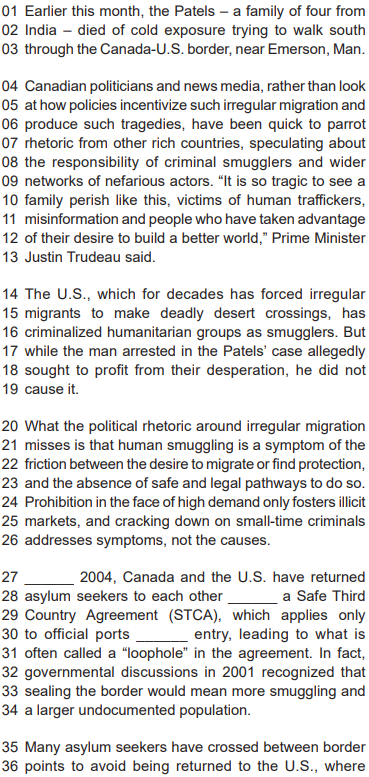Questões de Vestibular
Sobre interpretação de texto | reading comprehension em inglês
Foram encontradas 4.926 questões
“Hey there. You're probably wondering why you're getting this e-mail. The truth is, I put some malware on a website that you visited. My malware took control of your browser and recorded everything, including your contacts from your messenger, Facebook, and e-mail account. To top it all off, I also took videos of you. So I'll give you the option to make a deal before I do anything with it.”
(Adaptado de: https://mashable.com/article/chatgpt-scary-uses. Acesso em 12/05/2023.)
O e-mail criado pelo programa chama a atenção
The environmental and ethical implications of traditional livestock rearing, combined with an increasing global population and demand for protein-rich nutrition, has led to investments in alternative protein research. One emerging approach is cellular agriculture, in which traditional ‘meat’ tissues, such as muscle and fat cells from cows, chicken and fish, or alternative protein sources, such as algae, are cultivated under controlled laboratory conditions. However, the optimisation of these protocols is highly dependent on cell types, and further development is required to make cellular agriculture an economically viable alternative to traditional sources of protein. This special issue welcomes research on improvements to cellular agriculture protocols to maximize sustainable protein production.
(Adaptado de: https://www.nature.com/collections/chhdggaffd. Acesso em 12/05/2023.)
Qual seria o tópico específico da edição especial ao qual o texto se refere?
In some indigenous cultures, headdresses represent Native peoples’ right to govern themselves according to their own laws. The materials they are constructed with can vary greatly, including wood, iron, feathers, and ivory. Rather than using gridded designs (symbols of spiritual beliefs) or putting birds or mammals at center stage, as several others do, horns were attached to this headdress, an emblem of power reserved for those “whose exceeding worth and power is admitted by all the nation”.
(Imagens (nas alternativas) e texto (acima) adaptados de: https://americanindian.si.edu/ exhibitions/infinityofnations/introduction.html. Acesso em 31/05/2023.)
Qual das imagens corresponde à descrição da placa?
I have a dream that one day down in Alabama, with its vicious racists, with its governor having his lips dripping with the words of interposition and nullification; that one day right down in Alabama little black boys and black girls will be able to join hands with little white boys and white girls as sisters and brothers (Martin Luther King, 1963).
(Adaptado de: https://kr.usembassy.gov/martin-luther-king-jr-dream-speech-1963/. Acesso em 26/05/2023.)

Considere os dois textos e assinale a alternativa correta.
Besides these, another result of hustle culture is the one below:
The author presents a series of questions in the first paragraph.
These questions are used with the following purpose:


“It can choose hard line policies to the benefit of the Canadian security establishment and create more smugglers, even as its politicians heap blame on them when tragedy strikes.”


( ) The last sentence in Text 1 (lines 44 to 46) presents two examples of adjectives in the comparative degree. ( ) “avoid being returned” (line 36) is about an action that will/would happen while “remember being arrested” is about an action that has already happened. ( ) The two instances of the word “such” (lines 05 and 06) have the same idea as “such” in “I cannot imagine anyone living on such a small salary”.
The alternative that presents the correct top-down sequence of answers to the sentences above is




The paragraph below was taken out of Text 1.
“Just three months earlier, the U.K.’s Interior Minister blamed smugglers for the death of 31 people when a boat capsized, and vowed to pass laws to make it illegal to claim asylum.”
After which paragraph in the text can it be placed
back?

Available in: https://www.lingq.com/blog/english-language-memes/. Access in: 20 nov. 2021
Com base na imagem apresentada, é correto afirmar que
1. Hook Up the Drain Line. Depending upon your machine, you might have to hook up the drain connection to the back of the machine with a hose clamp. Sometimes, the drain connection is already installed. If yours is the latter, simply push the drain line into the drain line standpipe before plugging in the machine.
2. Test the Machine. Lastly, begin a test load to ensure the washer is working properly. When you begin the test load, check the water lines at all four connections for signs of a leak. Allow the machine to go through the full process so you can watch for proper drainage as well. Watching the machine carefully this first time can save you from a flood or maybe even a small leak that you may not catch right away.
3. Place the Machine. Using a dolly or a strong helper, carefully position the washing machine very close to the wall with the drain, hose outlets, and power outlet for beginning the process. 4. Plug in the Machine. Plug in the electric cord before you push the washer into the final position. Turn on the water lines.
5. Connect the Water Hoses. Then, connect the washing machine hoses to the water outlets behind the washing machine. Note that the outlets on the machine are "hot" and "cold." Keep track of the hoses so you can remember to hook them into the appropriate hot and cold valves.
STICKLEY, Aaron. How to install a washing machine. The Spruce: make your best home. Published in August, 30th, 2021. Available in: https://www.thespruce. com/installing-a-washing-machine-2718668. Acess in: 01 nov. 2021 (adapted).
Manuais de instrução trazem, em passos, etapas para instalação de máquinas. O texto dado explica como instalar uma máquina de lavar roupas. Entretanto, no texto, as etapas para esse procedimento estão desorganizadas. De acordo com o contexto, organize a sequência das etapas apresentadas em 1, 2, 3, 4 e 5. Sendo assim, a ordem correta para as instruções em sequência lógica e coerente do texto é a relativa aos

Available in: https://www.lingq.com/blog/english-language-memes/. Access in: 20 nov. 2021.
O efeito humorístico desse texto ocorre devido
Mental and physical health are interconnected. Social isolation’s adverse health consequences range from sleeplessness to reduced immune function. Loneliness is associated with higher anxiety, depression, and suicide rates. Isolation and loneliness are also linked to poor cardiovascular health and cognitive function:
A study led by an epidemiologist at Newcastle University concluded that deficiencies in social relationships are associated with a higher risk for coronary heart disease and stroke.
A study published in The Journals of Gerontology concluded that loneliness was associated with a 40 percent increase in the risk of dementia.
Links between social isolation and serious medical conditions are not fully understood, but ample evidence supports the connection. A study published in the American Journal of Epidemiology linked social isolation with higher risks of premature mortality. The Centers for Disease Control and Prevention (CDC) points to loneliness and isolation as serious public health risks.
Effects of Physical Distancing
Some effects of social isolation are specific to pandemics or other public health situations that require people to physically distance.
Loneliness and depression can go hand in hand with anxiety and fear about the dangers associated with the event that made physical distancing measures necessary. (???) Even people who are supportive of safetyrelated isolation and quarantine can experience frustration and irritability.
Understanding the Effects of Social Isolation on Mental Health. Tulane University - School of Public Health and Tropical Medicine. Published in: December 8, 2020. Available in: https://publichealth.tulane.edu/blog/effects-of-social-isolation-on-mental-health/. Access in: 30 oct. 2021 (adapted)
One sentence is missing in the text. According to the context, choose the alternative that correctly completes the idea of the text in the gap [showed in bold and highlighted as (???) in the text.

